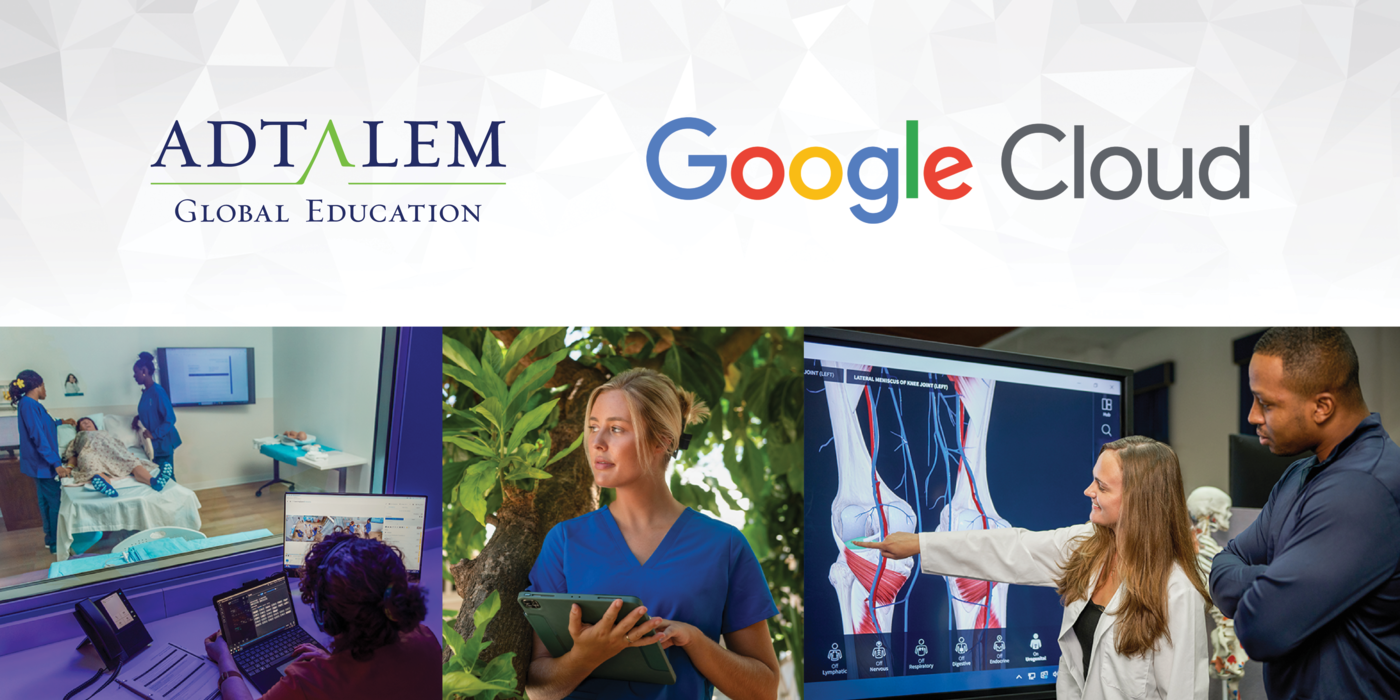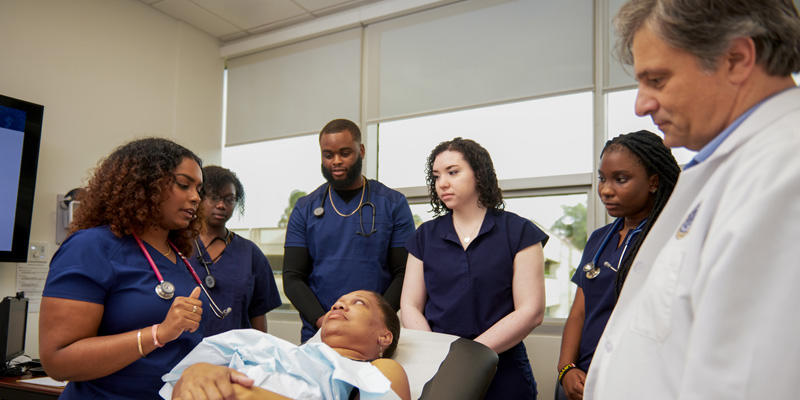Blake Simpson, left, and Dr. Jessica Shepherd, right, shared their personal and professional self-advocacy stories with a full room during a fireside chat at ColorComm conference.
Advice on self-advocacy from Adtalem Chief Communications Officer Blake Simpson and Dr. Jessica Shepherd, MD ’05, from their fireside chat at ColorComm conference.
ColorComm hosted its ninth annual conference in July, bringing together more than 400 multicultural women executives and professionals in communications, marketing, and media.
The standing-room-only fireside chat “Speak Up, Be Heard: Powerful Communication Tools for Health and Success” featured Blake Simpson, chief communications and corporate affairs officer for Adtalem Global Education, and Dr. Jessica Shepherd, an obstetrician and entrepreneur who earned her MD at Adtalem’s Ross University School of Medicine.
They discussed unique challenges women face and the critical impact that diverse representation can make. Through their personal experiences, they provided actionable strategies for women to ensure their voices are heard.
Here are a few of the highlights from their powerful and personal conversation about being your own best advocate.
Everyone’s Path to Self-Advocacy Is Different
Simpson: When I was pregnant with my first son in San Francisco, I searched and searched and searched for an African American OB, and the closest one in our area was two hours away from me. I ended up finding a fabulous OB, but I was her first African American patient.
It’s not until you’re in these situations and you start doing the research that you see these discrepancies in representation. That’s when I really started to flex my advocacy muscle. It’s work, and it’s a process.
Self-Advocacy Can Be Situation-Specific
Simpson: It’s interesting to recognize that you can be incredibly strong in your profession and in your day-to-day life, and somehow that does not translate when you are in the room with a medical professional.
Dr. Shepherd: You can be the biggest boss ever and walk into the doctor’s office and just shrink. I think that society has created a power construct between health professionals and patients. I understand the history of it, because back when there was no internet, doctors were the only ones who knew anything. Now that we have grown in the ability to do our own research, that really lends itself to having a discussion with a healthcare professional, but healthcare providers haven’t quite caught up to that.
Being Seen and Heard Comes with Representation
Dr. Shepherd: Representation comes in many forms: Who’s at the head of the table making the decision from an insurance carrier standpoint? Who are the CEOs of hospitals? Who is in med school to provide care?
Read “Results May Vary: The Importance of Diversity in Clinical Trials”
Simpson: There is a true ripple effect when you have institutions, like Ross University School of Medicine, that graduate a more diverse population and that population goes back into their community.
Ross University School of Medicine graduates more Black female physicians than any US medical school.
Changing the Narrative
Shepherd: A lot of times the health narrative in our communities is all bad. Imagine if the only information that you’re ever hearing is that you’re high risk for disease. At some point you’re just like, I don’t want to hear any more. We need to change that narrative to how can we all be our healthiest self.
Simpson: People sometimes feel like they don’t have a voice, or they don’t have a place. But you're the client, right? Flip the script. If you go into a store and you need a specific product and it’s not there, what do you do? You go ask for it. You ask for them to stock it because you’re going to be there on a regular basis.
Shepherd: I think we’re far removed from the days where the one doctor who you go to from adolescence has to be the doctor that you see throughout the rest of your life. You have the opportunity to find that provider who’s going to be your best advocate or be on the team to get you to your best quality of life. Be the CEO of your health.
Advocacy Needs to Start Early
Shepherd: I like talking to kids very early on about the power of what they can accomplish. I always wanted to be a doctor, but I didn’t necessarily have all the resources that I needed. My parents had no idea how to get me extra courses or tell me how to look for the better high schools and colleges that elevate your admissions application. I was a sophomore or junior in undergrad before I really understood what I needed to do.
Advocating for Your Health at Work
Simpson: Self-care and mental health are super important. If you’re too afraid to ask for time off, there’s a problem with your boss and there’s problem with your job. Take a deep breath and take the risk. What you may find is that all of a sudden the power shifts. You may find that they’re not as powerful as they feel. They’re powerful because you haven’t challenged them.
Shepherd: You can also pose the question to them: If someone is sick or needs a day off, what’s the best way for them to ask for it? Wait for an answer even if there’s uncomfortable silence. That will, a lot of times, give them a moment to say I didn't really think that through, or this is actually not something that I should have said.
More About Blake Simpson
Blake Simpson is senior vice president and chief of communications and corporate affairs for Adtalem Global Education. She leads global corporate communications, which includes investor, government, and media relations, as well as sustainability. Her career as a storyteller and strategic communications leader spans multiple industries, including network news in New York, retail, politics, and tech in Silicon Valley.
“One of the things I’m most proud of with regard to the work that Adtalem does is that we really do advocate for health equity. We advocate for a more inclusive model where we can graduate more professionals into medical communities, specifically people of color.”
Adtalem institutions combined graduate more Black physicians, both male and female, than any US medical school at more than 125 graduates each year.
More About Dr. Jessica Shepherd
Dr. Jessica Shepherd is an OB-GYN in Dallas, where she specializes in minimally invasive surgery for gynecological diseases. She is also an entrepreneur who founded Sanctum Med + Wellness and Her Viewpoint, and co-founded StellaVia Circle.
Dr. Shepherd has appeared as an expert on “Good Morning America,” “The Today Show,” CNN, “The Talk,” and Tom Joyner’s radio show. She has also been published in academic journal articles and Forbes, Cosmopolitan, Essence, Parents, and other top media outlets. She earned her Doctor of Medicine at Ross University School of Medicine.
For more information, email the Adtalem Global Communications Team: adtalemmedia@adtalem.com.
The above was a paid testimonial representing a genuine and independent personal experience about the educational experience.





